Selfish routing in public service
This paper discusses selfish routing in public service systems using a routing game framework. It motivates the work by reviewing previous literature on selfish behavior in queueing systems and the concept of price of anarchy. The main contributions are placing individual choice in public services like healthcare within a routing game model, analyzing the effect of demand and service worth on price of anarchy, and applying this to a case study of elective knee replacement services in Wales. Key findings include that price of anarchy increases with service worth up to a point and is highest when system capacity matches perceived service worth. The paper argues this framework could be useful for analyzing efficiency in other complex public systems.
![Selfish Routing in Public
Service
ļŖÖC╦─ ═§║ĶŌx
[ųĖī¦└ŽÄ¤] ĻÉ║═„ļ Į╠╩┌2015/1/16
Vincent A. Knight , Paul R.
Harper
School of Mathematics, Cardiff University, Cardiff, UK](https://image.slidesharecdn.com/selfishroutinginpublicservice-150315195502-conversion-gate01/85/Selfish-routing-in-public-service-1-320.jpg)
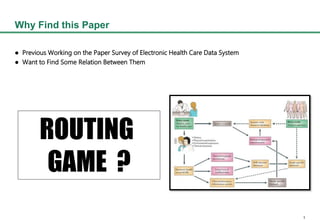
![2
Motivation of Paper & Previous Works
Equilibrium Behavior of a queueing system
Ī± Social optimization versus selfish optimization in waiting lines I. Adler, P. Naor 1969
How to Evaluate the Efficiency
Ī± Selfish Routing and the Price of Anarchy Tim Roughgarden, 2005
When Player Have Choice
[Removing Central Control for a Given System]
A Survey On
Networking Games in
Telecommunications
E. Altman 2006
Price of Anarchy in the
Markovian Single Server
Queue
G. Gilboa-Freedman, R. Hassin
2008
The Price of Anarchy
in Basketball
B. Skinner 2010
Public Service
e.g.
Health Care System?](https://image.slidesharecdn.com/selfishroutinginpublicservice-150315195502-conversion-gate01/85/Selfish-routing-in-public-service-3-320.jpg)
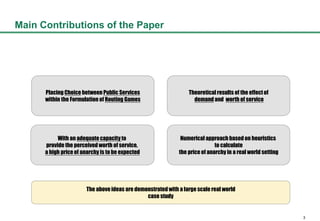
![4
Introduction of Routing Game
Here we focus on non-atomic routing game:
? = ?, ?
??????????? A ??? ?? ?????? ? ???? ?????: {(?1, ?1), (?2, ?2), . . . , (??, ??)}
??: ??? ??? ?? ??? ???????? (??, ??) ????? (??? ?????? ? Ī╩ [?])
?Ī╩? ?
?? = ?? ( ??? ?????? r: ? ?????????? ???????? ?? ??????? ???? ???? ?????? ???? ??????? ?? ?????)
???? ???? ??? ? ???? ???????? ??? ??? ??????? ?? ??? ???? Ī├ ?? (??? ? ????????, ??????, ??? ? ??????????)
? ? ?
?Ī╩?
? ? ? ?? ?
?Ī╩?
? ? ? ??
??? ??????? ???? ?? ??????? ?? (?, ?, ?)](https://image.slidesharecdn.com/selfishroutinginpublicservice-150315195502-conversion-gate01/85/Selfish-routing-in-public-service-5-320.jpg)
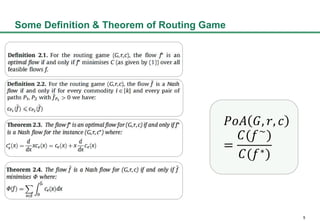
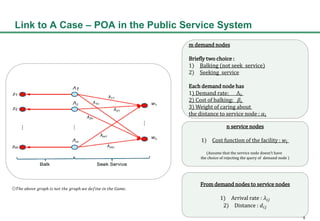
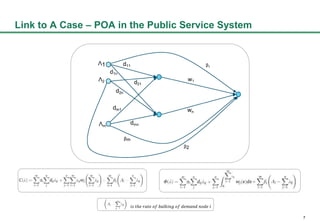
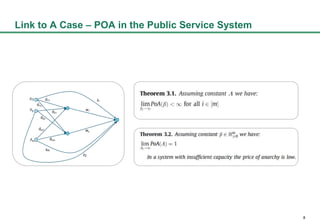
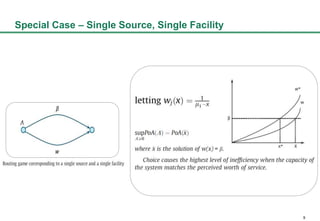
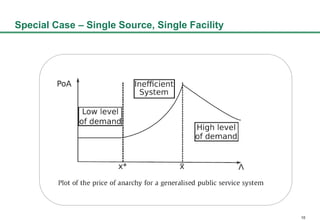
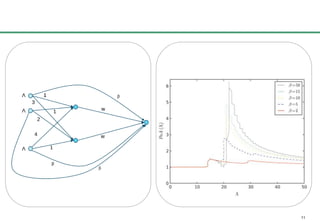
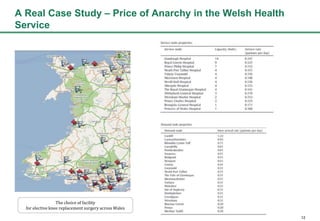
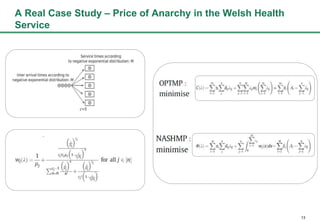
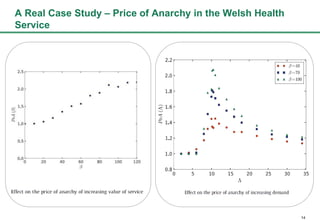
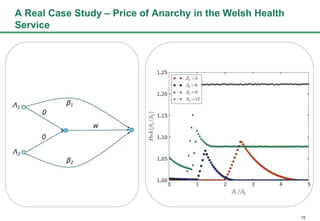
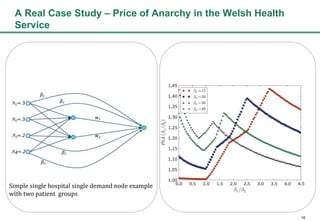
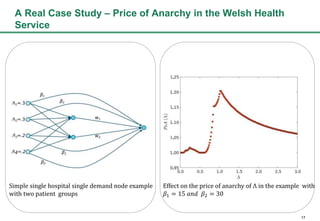

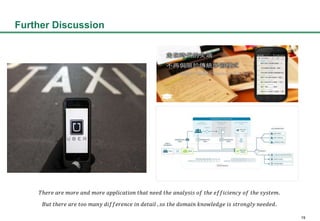

Recommended
More Related Content
Similar to Selfish routing in public service (9)
Recently uploaded (20)
Selfish routing in public service
- 1. Selfish Routing in Public Service ļŖÖC╦─ ═§║ĶŌx [ųĖī¦└ŽÄ¤] ĻÉ║═„ļ Į╠╩┌2015/1/16 Vincent A. Knight , Paul R. Harper School of Mathematics, Cardiff University, Cardiff, UK
- 2. 1 Why Find this Paper Ī± Previous Working on the Paper Survey of Electronic Health Care Data System Ī± Want to Find Some Relation Between Them ROUTING GAME ?
- 3. 2 Motivation of Paper & Previous Works Equilibrium Behavior of a queueing system Ī± Social optimization versus selfish optimization in waiting lines I. Adler, P. Naor 1969 How to Evaluate the Efficiency Ī± Selfish Routing and the Price of Anarchy Tim Roughgarden, 2005 When Player Have Choice [Removing Central Control for a Given System] A Survey On Networking Games in Telecommunications E. Altman 2006 Price of Anarchy in the Markovian Single Server Queue G. Gilboa-Freedman, R. Hassin 2008 The Price of Anarchy in Basketball B. Skinner 2010 Public Service e.g. Health Care System?
- 4. 3 Main Contributions of the Paper Placing Choice between Public Services within the Formulation of Routing Games Theoretical results of the effectof demand and worth of service Numerical approach based on heuristics to calculate the price of anarchy in a real world setting The above ideas are demonstratedwith a large scale real world case study With an adequatecapacity to provide the perceived worth of service, a high price of anarchy is to be expected
- 5. 4 Introduction of Routing Game Here we focus on non-atomic routing game: ? = ?, ? ??????????? A ??? ?? ?????? ? ???? ?????: {(?1, ?1), (?2, ?2), . . . , (??, ??)} ??: ??? ??? ?? ??? ???????? (??, ??) ????? (??? ?????? ? Ī╩ [?]) ?Ī╩? ? ?? = ?? ( ??? ?????? r: ? ?????????? ???????? ?? ??????? ???? ???? ?????? ???? ??????? ?? ?????) ???? ???? ??? ? ???? ???????? ??? ??? ??????? ?? ??? ???? Ī├ ?? (??? ? ????????, ??????, ??? ? ??????????) ? ? ? ?Ī╩? ? ? ? ?? ? ?Ī╩? ? ? ? ?? ??? ??????? ???? ?? ??????? ?? (?, ?, ?)
- 6. 5 Some Definition & Theorem of Routing Game ??? ?, ?, ? = ?(?~ ) ?(??)
- 7. 6 Link to A Case ©C POA in the Public Service System Ī“??? ????? ????? ?? ??? ??? ????? ?? ?????? ?? ??? ????. m demand nodes Briefly two choice : 1) Balking (not seek service) 2) Seeking service Each demand node has 1) Demand rate: ”½ ? 2) Cost of balking: ?? 3) Weight of caring about the distance to service node : ?? n service nodes 1) Cost function of the facility : ?? (Assume that the service node doesnĪ»t have the choice of rejecting the query of demand node ) From demand nodes to service nodes 1) Arrival rate : ??? 2) Distance : ???
- 8. 7 Link to A Case ©C POA in the Public Service System ?? ??? ???? ?? ??????? ?? ?????? ???? ?
- 9. 8 Link to A Case ©C POA in the Public Service System
- 10. 9 Special Case ©C Single Source, Single Facility
- 11. 10 Special Case ©C Single Source, Single Facility
- 12. 11
- 13. 12 A Real Case Study ©C Price of Anarchy in the Welsh Health Service The choice of facility for elective knee replacement surgery across Wales
- 14. 13 A Real Case Study ©C Price of Anarchy in the Welsh Health Service
- 15. 14 A Real Case Study ©C Price of Anarchy in the Welsh Health Service
- 16. 15 A Real Case Study ©C Price of Anarchy in the Welsh Health Service
- 17. 16 A Real Case Study ©C Price of Anarchy in the Welsh Health Service Simple single hospital single demand node example with two patient groups
- 18. 17 A Real Case Study ©C Price of Anarchy in the Welsh Health Service Simple single hospital single demand node example with two patient groups Effect on the price of anarchy of ”½ in the example with ?1 = 15 ??? ?2 = 30
- 19. 18 Conclusion Ī±The price of anarchy increases with worth of service, up to a point. Ī± In a system with insufficient capacity the price of anarchy is low Ī± When considering the public service system as a whole, the highest level of inefficiency occurs when the capacity of the system matches the perceived worth of service.
- 20. 19 Further Discussion ????? ??? ???? ??? ???? ??????????? ???? ???? ??? ???????? ?? ??? ?????????? ?? ??? ??????. ??? ????? ??? ??? ???? ?????????? ?? ?????? , ?? ??? ?????? ????????? ?? ???????? ??????.